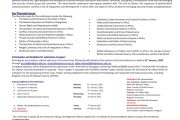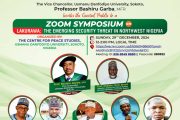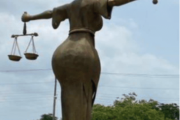By Aminu Ali

The author
Nigerians are creatively humorous and they use every moment (whether of joy or grief) to demonstrate this. The way they crack jokes to laugh off their pains is quite amazing. There is this tendency to defy being overwhelmed by sorrow, fear or even helplessness in the face of adversity. In other words, when they are distressed, they drive emotional solace from humour. This attitude was once described by the popular Afro-beat musician, Fela Anikulapo Kuti, as “suffering and smiling.” Years after his demise, our life is still characterized by this veridical paradox.
Despite the global sensibility that has trailed the outbreak of coronavirus, Nigerians manage theirs with rib cracking humour. Perhaps this humour gives them more succour than their confidence in government’s preparedness to curtail the spread of the virus or its effort to allay their fears. One needs to follow the way Nigerians twist the COVID-19 pandemic into a joke to understand this. The social media space is replete with such wry witticism. In what follows, I catalogue and analyze some of these humorous posts, cartoons and the videos:
Following President Buhari’s initial silence on the spread of the COVID-19, Nigerians earnestly asked him to brief the nation about the efforts of his government to combat the pandemic. The President finally broke silence in a short video released by one of his media aides. But Nigerians were still shattered when he mispronounced the novel virus as COVIK one, nine. Many people believed that President Buhari’s pronunciational faux pas implied that he was likely unaware of this global health emergency. However, in mocking him, Nigerians laughed off their anger over his alleged initial indifference to the spread of the virus and the shock that trailed his mispronunciation faded.
Moreover, even when the President correctly pronounced COVID-19 in a national broadcast on March, 29th, 2020, he was still not spared by the gist merchants. Someone wrote: “the only thing that is new in the broadcast is that the President pronounced the word “COVID-19” correctly. Whether this is true or not, the intent was to express dissatisfaction if not disappointment with the President’s speech.
After issuing the stay at home order in some states across the country, someone wrote: “Caveat Emptor: this is to warn you that the Federal Government will not be held responsible for any pregnancy during this period. The Government has only advised isolation, not copulation. It’s an order to stay at home, not an order to stay under the duvet” This suggests that with the stay at home instructions, coital frequency and, by extension, risk of pregnancy and childbirth will invariably increase. The joke is, therefore, a reminder to married people to be demographically conscious while they choose ways to ease the boredom imposed by the stay at home order. As a demographer, I find this quite interesting!

Battling with pronounciation, infection of top aides as well as seen and unseen fallouts of lockdown, especially the demographic risk
When the news broke that President Buhari’s Chief of Staff and some state governors were in self-isolation and samples of their blood were tested to ascertain their COVID-19 status, someone took to social media to make this witty remark: “Nigerian politicians patiently await the results they cannot rig.” The statement was intended to mock Nigerian politicians for their rigging culture. It implies that in spite of their notoriety, certain things are beyond their manipulation and, as such, they have to accept them as they are.
And when, eventually, some of these politicians tested positive, this post went viral: “the way coronavirus is carefully picking its target one by one suggests that it is fighting corruption more than the EFFC” This seems to imply that the author of this post sees the selective targeting of our political leaders by the COVID-19 as karmic comeuppance for their misdemeanour. Many people condemned those sharing this remark as lacking empathy. But is this necessarily the case or is it the usual way of twisting serious issues into a joke by Nigerians or both?
There was one cartoon I found very striking. It depicts a hut tagged “Nigerian hospital” with nurses carrying a patient on a stretcher at the hospital gate. The patient protests against taking him inside the hut because he is a politician while the nurses remind him that the hut (hospital) is his project. The message illustrated in the cartoon is very clear: Nigerian politicians are left with no option than to experience the rot and decay in the healthcare system they have over the years neglected or grossly underfunded. For once they will relate with everyday experiences of Nigerians.
A former Senator representing Kaduna Central Senatorial District, Mr Shehu Sani, posted this statement on his Facebook timeline: “With N10 billion given to Lagos, some governors go soon set up mobile testing on the road in their states and the results to be announced by themselves” This seemingly alludes that Nigerian leaders are notorious for their tendency to profit from the misfortune that befalls their subjects. Mr Sani’s post reminds me of a story I was told about a decade or so ago. There was a village in my state that was ravaged by flood, which displaced many people and destroyed their means of livelihood. The state governor immediately released funds to the Council Chairman of the affected area and directed him to do everything possible to cater for the urgent needs of the victims. A fellow Council Chairman – who either visited or called him on phone – congratulated, instead of sympathizing, with him. He even reportedly said that he wished it were in his area that the flood occurred so that he could enjoy such largesse.
I also watched a video showing a man – referred to as the Academic Staff Union of Universities (ASUU) – trying to lock a university gate. Another man – referred to as coronavirus – suddenly arrives the scene, pushes ASUU inside and locks the gate. It can be recalled that ASUU was on a two-week warning strike when the Federal Government of Nigeria announced the closure of all schools and universities. The video was, therefore, intended to comically demonstrate that the closure of the Nigerian universities following the outbreak of coronavirus has made the ASUU strike ineffective.

Easier said than done for, certainly, staying @ home is easier for those staring at affluence than those poverty is staring @!
An aerial image of a slum, which was purportedly taken in Ibadan, went viral on social media. The picture is accompanied with a caveat: “stay at home and avoid congested places.” There is also a humorous statement below the image, which reads: “social distancing in Ibadan requires Pythagoras Theorem.” The aim is to illustrate the pattern of settlement in this Nigerian city, and how social distancing is well-nigh impossible in a squatter settlement. For instance, it is common to find neighbourhoods where a family of four members shares a room and two or more families share a toilet. Maintaining social distancing in this situation requires magic.
Another humorous post I saw in one of the WhatsApp groups in which I am a member reads: “If you are staying at home with money you are in self-isolation. If you are staying at home, broke, you are in quarantine. But if you are staying at home, broke and with a troublesome wife, then you are in a total lockdown. May God save you” This means that the boredom of staying at home at this trying time can be moderated by affluence and having a nice wife to comfort one. Put in another way, Nigerians will be affected differently by the stay at home order/lockdown, and the adverse effects will be most severe among poverty-stricken people, who also have troublesome wives.
As Nigerians are made to stay at home, one should expect more of these jokes to thrive on social media. The latent effect of this is that it may trivialize the COVID-19 pandemic and, by extension, make people reluctant to take precautionary measures. Why do Nigerians have the tendency to twist serious issues into jokes? The answer to this question is not immediately available to me. But I think it is worth engaging, maybe in future articles.
Aminu Ali, the author, sent in this piece from the Department of Sociology, Bayero University, Kano and he can be reached via aminuali@yahoo.com




























